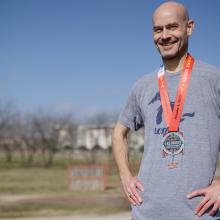Feature
JPS Health Network Named a Gallup Exceptional Workplace Winner
JPS Health Network has been named a Gallup Exceptional Workplace Award (GEWA) winner, marking the second consecutive year our health network has received this prestigious global recognition. In 2025, just 73 organizations worldwide earned this honor, with JPS standing out as one of only 7 U.S. health systems selected.
Dedicated to Advancing Quality of Care
JPS Health Network proudly hosted its 2025 Research & Quality Symposium (RQS), an annual celebration of innovation, collaboration, and academic excellence in healthcare. Held on Wednesday, May 14, the event brought together researchers, clinicians, educators, and community partners for a dynamic day of poster sessions, rapid-fire presentations, topical breakout discussions, and awards recognizing exceptional contributions to research, education, and quality improvement.
Hope Through Healing
When Kimberlea Williams walked into the emergency room with a persistent cough, she had no idea her life was about to change. After multiple visits and multiple diagnoses, such as bronchitis, pneumonia, and sinus infections, her condition worsened. In August 2018, she received life-altering news. She was told that she had stage four lung cancer, and it had already spread to her brain.
Driven by Compassion
The JPS Health Network nursing team hosted a Nurse Award Celebration on Wednesday, May 7, to celebrate the talented and dedicated nurses at JPS. Each nurse was honored for the exceptional care they provide for patients and the positive impact they have on many lives. This year, the nursing team recognized the recipients of the Gold Stethoscope Award, which honors nurses who are committed to delivering outstanding clinical and compassionate care.
A Heart for Helping
At JPS Health Network, we believe that healthcare isn’t just about medicine; it’s about transforming lives and communities. Our volunteers play a key role in this mission. They do more than assist, they bring warmth, compassion, and a personal touch that lifts patients, families, and team members. From guiding someone through the halls to offering a kind word or simply listening, volunteers help create a welcoming, healing environment that defines JPS.
The Importance of Continuity of Care
JPS Health Network is redefining primary care by creating environments that inspire innovation and build patient trust. To meet the growing needs of the community, JPS recently opened Medical Home Southwest Tarrant – a thoughtfully designed facility that expands access to comprehensive, patient centered care. The new site now houses the relocated South Campus Health Center, offering a broader range of services in a welcoming environment.
Congratulations to our 2025 Fort Worth Magazine Top Doctors
We’re proud to celebrate the 101 JPS physicians who were named to the 2025 Fort Worth Magazine Top Doctors list. This annual list honors physicians for their dedication to providing compassionate, comprehensive, and high-quality care. Peer-nominated across various specialties, the nominees undergo an extensive review by a panel of physicians.
JPS Health Network Named One of the Best Workplaces Worldwide
JPS Health Network has been recognized as a Gallup Exceptional Workplace Award winner for the second consecutive year, placing the health system among the most engaged and high-performing organizations worldwide. This year, JPS is one of only 70 organizations globally to receive the honor and one of just seven health systems in the United States to earn this distinction. The award underscores JPS’s continued commitment to fostering a workplace culture that empowers employees and enhances patient care.
Winter Weather Safety Tips
Safely navigating winter weather
In Texas, the weather can be very unpredictable. If you are not properly prepared, this can lead to dangerous situations.
Preparing yourself and being aware of winter hazards is important. With education and action, you can be sure that this winter won’t catch you off guard!
Pagination
- Previous page
- Page 2
- Next page









